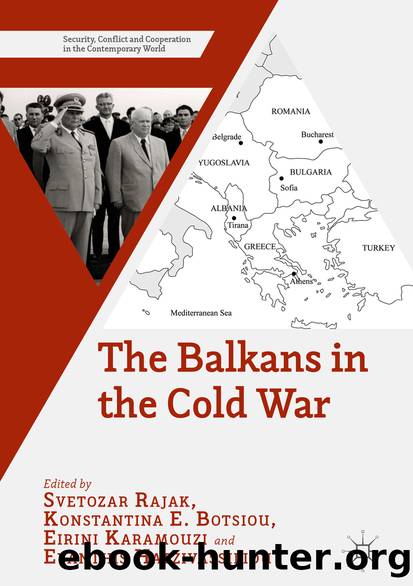The Balkans in the Cold War by Svetozar Rajak Konstantina E. Botsiou Eirini Karamouzi & Evanthis Hatzivassiliou

Author:Svetozar Rajak, Konstantina E. Botsiou, Eirini Karamouzi & Evanthis Hatzivassiliou
Language: eng
Format: epub
Publisher: Palgrave Macmillan UK, London
The Soviets were not the only party that sought to profit from Yugoslaviaâs internal difficultiesâpolitical emigration also had its plans. On 2 December 1970, Dragutin Haramija, president of Croatiaâs Executive Council (government), sent a letter to federal Prime Minister Mitja RibiÄiÄ, in which he charged that the foreign ministry intelligence officers (notably Äuro PintariÄ of the Yugoslav Military Mission at Berlin) were spreading a âmajor insinuationâ that the leadership of Croatia was in contact with Dr. Branko JeliÄ, a Croat nationalist émigré, resident in West Berlin, who supposedly had established contacts with Moscow. The outcome of these âcontactsâ would be an independent communist Croatia, from Trieste to the Drina River, integrated within the Soviet bloc and with the Soviet type of socialism. In exchange, the USSR would get military bases at Mostar and Rijeka. The source for these allegations was JeliÄâs aide Velimir TomuloviÄ, who was actually an agent of Yugoslav intelligence. Haramija demanded an inquiry and punishment for those responsible. The Soviets were very sensitive about these developments. On 9 December 1971, an employee of the Soviet embassy in Belgrade turned over a copy of JeliÄâs newspaper Hrvatska država (Croatian State) to the Yugoslav foreign ministry, noting that the material was mailed from West Germany and that the Soviets were aware that this publication was forbidden, but that the Soviet side insisted âthat they inform us of this, so that the impression would not be created that the embassy subscribes to such publicationsâ. 9
The émigré affair escalated during the period of inquiry. The members of the federal commission could not agree on a conclusion. When the commission met at the Brioni Islands on 23 April 1971 the majority concluded that âthe federal administrative organs, their services, and individuals employed in them did not participate in any kind of conspiracy or in the initiation and dissemination of political intrigues about the alleged connections between the hostile emigration and the political leadership of SR Croatiaâ. 10 The conclusion was not signed by a commission member Nikola PavletiÄ, himself from Croatia, and it was not accepted by two other Croat ministers, Mirjana KrstiniÄ, and a Deputy Prime Minister Jakov SirotkoviÄ.
In order to resolve the matter the seventeenth session of the Presidency of the League of Communists of Yugoslavia (LCY) met on the Brioni Islands on 28â30 April 1971. The atmosphere was tense and soul-searching. First the Executive Committee of the Presidency met on 28 April amid pleas from Edvard Kardelj (Slovenia) that the public must be soothed and also from Budislav Å oÅ¡kiÄ (Montenegro) that the matter âbe left to the state organsâ. 11 In line with the ambiguous attitudes to the âaffairâ, the Presidency concluded thatthere occurred a strengthening of the external hostile subversive activity, which utilized our internal difficulties and relied in its activities on the enemies in our country. In connection with this hostileâanti-Yugoslav and antisocialistâactivity, an action that aimed at disqualifying the political leadership of SR [Socialist Republic] Croatia was organized with the aim of provoking political instability, inter-republic
Download
This site does not store any files on its server. We only index and link to content provided by other sites. Please contact the content providers to delete copyright contents if any and email us, we'll remove relevant links or contents immediately.
| Africa | Americas |
| Arctic & Antarctica | Asia |
| Australia & Oceania | Europe |
| Middle East | Russia |
| United States | World |
| Ancient Civilizations | Military |
| Historical Study & Educational Resources |
Magic and Divination in Early Islam by Emilie Savage-Smith;(1533)
Papillon by Henry Charrière(1423)
Bohemians, Bootleggers, Flappers, and Swells: The Best of Early Vanity Fair by Bohemians Bootleggers Flappers & Swells- The Best of Early Vanity Fair (epub)(1394)
Ambition and Desire: The Dangerous Life of Josephine Bonaparte by Kate Williams(1383)
Twelve Caesars by Mary Beard(1313)
Operation Vengeance: The Astonishing Aerial Ambush That Changed World War II by Dan Hampton(1155)
What Really Happened: The Death of Hitler by Robert J. Hutchinson(1154)
London in the Twentieth Century by Jerry White(1145)
The Japanese by Christopher Harding(1130)
Time of the Magicians by Wolfram Eilenberger(1125)
Twilight of the Gods by Ian W. Toll(1115)
Lenin: A Biography by Robert Service(1073)
The Devil You Know by Charles M. Blow(1024)
A Social History of the Media by Peter Burke & Peter Burke(968)
Freemasons for Dummies by Hodapp Christopher;(963)
Napolean Hill Collection by Napoleon Hill(936)
Henry III by David Carpenter;(919)
The Rise and Triumph of the Modern Self by Unknown(912)
The Churchill Complex by Ian Buruma(906)
